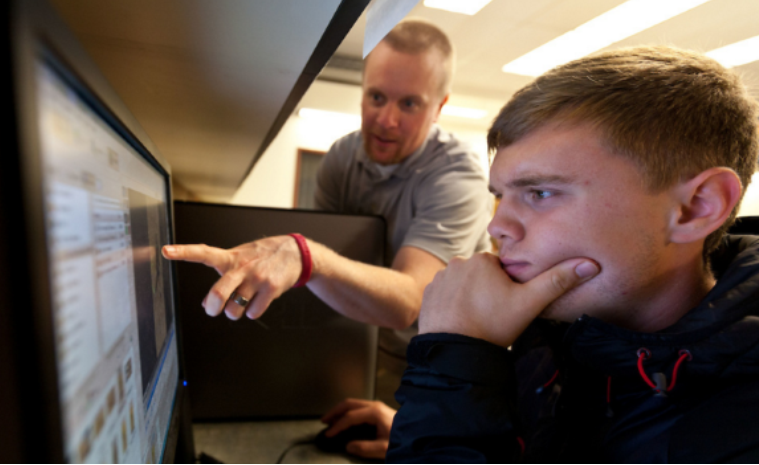
Pre-PT Coursework
At PLU, there are two routes to completing your prerequisites for admission to a PT program.
- BS in Kinesiology with a concentration in Pre-Physical Therapy
A concentration in Pre-Physical Therapy provides preparation for entry into Doctor of Physical Therapy degree programs throughout the United States. The degree is heavily centered on the natural sciences and includes an internship placement in one or more physical therapy clinics in the region. These internship opportunities are an excellent way to begin gathering real world experience, as well as to develop and apply your training and education in a professional setting. A listing of the internship placement sites can be found here. - A Major in a Natural Sciences Discipline
If you’re unsure about committing to a PT program, an approach with greater flexibility might be right for you. This route allows you to fulfill the requirements for admission to a school of physical therapy but gives you more career options.
In general, the following coursework satisfies the required and recommended courses for admission to a school of physical therapy. Note this represents general guidelines and requirements vary from one school to the next.
The prerequisites for grad schools in Washington:
The American Physical Therapy Association also provides a list of accredited PT and PTA programs available in the United States and a summary of each program’s prerequisites.
Biology Courses
The following courses are required by most programs:
- BIOL 225: Molecules, Cells, and Organisms
- BIOL 226: Genes, Evolution, Diversity and Ecology
You might also consider some of the following upper level courses:
- BIOL 353: Comparative Anatomy
- BIOL 444: Neurobiology
- BIOL 453: Human Physiology
Most PT schools require you to take courses in anatomy and physiology. Please make sure you look at the requirements of individual schools, particularly whether they require a two-course sequence in Human Anatomy and Physiology, which is offered at PLU.
Social and Behavioral Science Courses
The PTCAS Course Prerequisite Summary, provided by the American Physical Therapy Association, suggests that most schools require one or more social and behavioral courses. Many programs require specific courses while others accept any completed courses in the subject area, please check with your chosen school to make sure you fulfill this requirement.
We recommend you take the following courses:
- PSYC 101: Introduction to Psychology
- SOCI 101: Introduction to Sociology
Chemistry Courses
Take the following two-course sequence in general chemistry:
- CHEM 115: General Chemistry I*
- CHEM 116: General Chemistry II
You might also consider taking a semester of organic chemistry:
- CHEM 331/333: Organic Chemistry I + lab
*Note: Math 140 is a prerequisite or co-requisite for CHEM 115.
Physics Courses
PLU has two introductory physics series. Students interested in physical therapy should take the sequence that is required for their intended major. Students majoring in biology usually take the PHYS 125/126 series with accompanying labs, while those majoring in chemistry or physics must take the PHYS 153/154 series with accompanying labs.
Mathematics/Statistics Courses
Many PT programs do not require math courses as part of their prerequisite courses, however, statistics courses are required for most programs. We recommend at least one math course be taken along with your statistics course. Math requirements vary by program, please refer to the specific program you have chosen to be sure your Math requirements are fulfilled.
Professional Experiences
Experience in Physical Therapy
In order to be a competitive applicant for PT programs, you must have significant experience in the field through volunteer or paid opportunities working with practicing certified physical therapists. Admissions committees encourage applicants to seek out observation experiences in diverse settings to provide an understanding of inpatient and outpatient populations. Examples of PT settings may include, but are not limited to: hospitals, clinics (sports medicine, pediatrics, hand therapy), private offices, home health, skilled nursing/extended care facilities and schools.
Physical therapy programs that require field experience are usually specific regarding the length of time and types of experiences they are looking for in applicants. It is best to know the kinds of previous healthcare experience a program requires before you apply. For example, Eastern Washington University requires applicants to complete a minimum of 75 hours of work/observation/volunteer experience under the supervision of a licensed physical therapist. This experience must be verified by the supervising physical therapist. In addition, the University of Washington requires applicants to have a minimum of 50 hours of PT-related experience with a physical therapist on staff, though many complete much more – some in the range of 100 to 200 hours. All hours, whether they’re volunteer, paid, shadow or observation hours, are weighted equally in the admissions process. Furthermore, they recommend you get experience in more than one practice setting.
Community Engagement
In addition to clinical experience, medical schools prioritize applicants who demonstrate a commitment to service and working in communities different from their own. Consider some type of volunteer experience, such as helping out at a food bank or soup kitchen. There are endless opportunities for you to volunteer your time, many of which you can find out about through your university, local churches, community newspaper/bulletin, or personal acquaintances. Admission committees don’t have a specific list of “appropriate” volunteer opportunities – choose volunteer opportunities that are meaningful to you.



